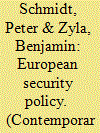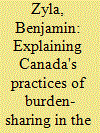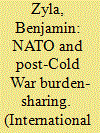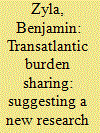|
|
|
Sort Order |
|
|
|
Items / Page
|
|
|
|
|
|
|
| Srl | Item |
| 1 |
ID:
134622


|
|
|
|
|
| Summary/Abstract |
Initially, recognition of the vital role played by regional diplomacy did not accompany NATO’s substantial commitment to economic and political development in Afghanistan from 2001 to 2014. Pakistan in particular had a major influence on the conduct of reconstruction efforts and NATO’s efforts to lay the institutional foundations in Afghanistan. Canada, an early and committed participant in the International Security Assistance Force, would by 2005 come to recognise the vital importance of the role of Pakistan in the outcome of the mission. However, regional limits to the influence of the United States, the North Atlantic Treaty Organisation, and Canada made comprehensive efforts unattainable.
|
|
|
|
|
|
|
|
|
|
|
|
|
|
|
|
| 2 |
ID:
108774


|
|
|
|
|
| Publication |
2011.
|
| Summary/Abstract |
With the Lisbon Treaty in place and the European Union increasingly involved in crisis management and stabilization in places near and far, this Special Issue examines whether European security behaviour is evidence of an actual strategic culture. Contrary to prevailing scholarship on the subject, this volume demonstrates that strategic culture, as an analytical tool and force on European strategic goals and conduct, is far from conclusive. Ostensibly, the development of a security culture was a major lever by which the European Union's principal planning document, the European Security Strategy of 2003, tried to guide the European Union's role in international security. This volume revisits the trajectory of the concept of strategic culture and examines its application in a variety of circumstances, especially operations in Africa and the Balkans, including joint operations with NATO and the United Nations. The contributors to this Special Issue find that strategic culture is a useful tool to understand EU's operations, not in the sense of a 'cause', but as a uniquely European normative framework of preferences and constraints. Classical notions of strategic culture must be adapted to highlight the specific evolution of Europe's strategic culture. Though at variance over the extent to which security and defense missions have promoted a shared strategic culture in Europe, the authors in this Special Issue reveal a growing sense that a strategic culture is critical for European ambition as a global actor. Should Europe fail to nurture a shared strategic culture, its ambitions and the normative framework that underpins it will unravel.
|
|
|
|
|
|
|
|
|
|
|
|
|
|
|
|
| 3 |
ID:
124413


|
|
|
|
|
| Publication |
2013.
|
| Summary/Abstract |
While Canadian burden-sharing practices within NATO in the 1990s are well documented, the data in the literature raise two central questions: (1) was the practice of Canadian burden-sharing a one-time event, or was it part of a larger pattern of practices? and (2) what factors motivated Canada to shoulder the burden to the extent that it did? This article studies the extent of Canada's burden-sharing practices in the context of the International Security Assistance Force (ISAF) mission in Afghanistan. The article makes two arguments: first, Canada's commitment to NATO continued to be strong post-9/11; second, Canada's practices of sharing Atlantic burdens can be explained by its adherence to the norm of "external responsibility," which guided its foreign policy by appealing to Canada's humanitarian responsibilities to contribute at an extraordinary level to the promotion and maintenance of international peace and security.
|
|
|
|
|
|
|
|
|
|
|
|
|
|
|
|
| 4 |
ID:
106887


|
|
|
| 5 |
ID:
090670


|
|
|
|
|
| Publication |
2009.
|
| Summary/Abstract |
This article challenges this accepted wisdom. Instead, it argues that Canadian burden-sharing in NATO in the 1990s was consistent with its relative capabilities to contribute to the alliance. Speacifically, it argues that Canada was not the laggard of the transatlantic alliance. In some instances, Canada even overperformed in comparision with its NATO allies and made more resource available than it was given credit for. In that sense, this article provides a revisionist analysis of Canada's performance in NATO and a more nuanced picture of Canada's role in the world in the 1990s.
|
|
|
|
|
|
|
|
|
|
|
|
|
|
|
|
| 6 |
ID:
108784


|
|
|
|
|
| Publication |
2011.
|
| Summary/Abstract |
This paper discusses the inter-organizational relationship of the two leading security organizations in Europe: the European Union and the North Atlantic Treaty Organization. Rather than discussing the two organizations' material overlaps, the paper discusses their quest for organizational identity and role in the domain of foreign and defence policy, as well as the ideational structures that affect both institutions' social behaviour and their behaviour toward each other. It aims first to tease out how structures of meaning in the form of norms, values, and beliefs have affected the two organizations' behaviour toward each other; and second to introduce explanatory arguments about their subcultural relationship that can help explain their attitudinal divergences. The article makes two arguments: First, there is a significant normative overlap between the two institutions, especially with regards to future challenges and threats and the role of third parties and international organizations. Second, I introduce a preliminary argument by holding that the best way to make sense of the ideational divergences between the two organizations is to conceptualize NATO's strategic culture as a subculture of the European Union's strategic culture.
|
|
|
|
|
|
|
|
|
|
|
|
|
|
|
|
| 7 |
ID:
162504


|
|
|
|
|
| Summary/Abstract |
Current studies on NATO burden sharing are only able to show some weak statistical trends between selective variables; they are unable to explain and show why this trend exists and why it occurred at particular times (or not). This is due to the dominant deductive and hypothesis testing research designs that prevent researchers to produce richer causal explanations or intersubjective understandings of how states, for example, construct and assign meaning to burdens or what forms of social representation, values, norms and ideals influence the making of (national) burden sharing decisions. Thus, we charge, the literature needs to adopt an eclecticist approach to studying NATO burden sharing – that is to combine rationalist with sociological approaches and methodologies highlighting the importance of intersubjective meanings and the role of social forces, norms, beliefs, and values. The article lays out what such a research programme might look like and how one could operationalise it.
|
|
|
|
|
|
|
|
|
|
|
|
|
|
|
|
| 8 |
ID:
145022


|
|
|
|
|
| Summary/Abstract |
It is commonly accepted that peace operations produce public goods. Informed by theories of collective action, the article tests the claim that middle powers were free-riders in NATO’s peace operations in the Balkans (IFOR, SFOR, KFOR) from 1995–2001. In so doing, we charge that calculating the level of defence spending as a share of a country’s GDP, which has become the standard index in the literature, is limiting. We suggest that the active military-duty force share index is a better index to use, and find that middle powers did not free-ride in NATO’s peace operations in the 1990s. Quite to the contrary: they contributed more to NATO’s public good of peacekeeping than countries like France or Germany, and more than expected based on their economic abilities measured in GDP. The article then asks what could be inferred from this analysis, and offers theoretical and methodological points of critique before suggesting new avenues for future research in this vibrant research programme.
|
|
|
|
|
|
|
|
|
|
|
|
|
|
|
|
|
|
|
|
|